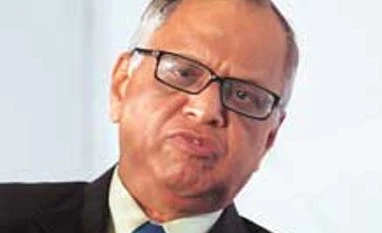"I used to start my presentation with a world map showing 'here is India, here is Bangalore where I come from, and I speak English', before setting the context," said S D Shibulal, one of the co-founders of Infosys, who used to head the sales function in those early days.
So, in a way, when N R Narayana Murthy started Infosys in 1981 with six other colleagues, he knew he was venturing into uncharted territory. There was no proven model, no successful entrepreneur in the field, nobody to guide them. They had to create their own path, blazing a trail for others to follow. It's not that Murthy did not try his luck with entrepreneurship earlier. In 1976, he started Softronics, a company that lasted only a year and a half year, as he quickly realised that the domestic market was still not ready for IT services. This experience taught him that he needed to focus on exports. He joined Patni Computer Systems, before going on to found Infosys.
More From This Section
Back then, joining the Indian Administrative Service ranked high among students' aspirations, while working for the private sector was looked down upon. When Murthy completed his engineering degree, his parents initially wanted him to write the civil services examination and join the government. However, he was able to persuade them to allow him to chart his own future.
The first decade after Murthy founded Infosys in 1981 was the toughest, but the environment turned benign once the economy began to be liberalised in 1991. Firstly, growth at least until the 1991 economic reforms was very slow. He had to keep the herd together and work against the odds to prove the worth of the global delivery model. He also had to overcome the challenges posed by the lack of infrastructure in India, besides learning ways and means to deal with the government and regulators. "Of the 21 years of my CEO-ship, about 11 years were lost fighting for licences, and I used to make 50 visits a year to Delhi. As there was no current account convertibility, we could not open offices overseas, and importing even a small piece of equipment required a huge effort," he recalls.
Sometime in 1991, a few within the core founding team began to wonder whether it was worth continuing with the venture, or better to sell out. Some were excited at receiving an offer (also in 1991) for $1 million. "I argued with them that we had already gone through nine years and we will soon see light at the end of the tunnel: 'I will continue; if any of you want to leave, you can leave'. They all decided to continue," Murthy recalls. After that, there was no looking back.
Growth began to pick up from 1995 and Infosys's revenues touched $100 million in 1999, the year the company listed on Nasdaq. But it took just three years after that to reach $500 million and five years to soar to $1 billion. Murthy still recalls that his most memorable moment at the company was sitting on the high stool under the scorching lights of the Nasdaq stock exchange and becoming the first Indian company to achieve this distinction.
Under Murthy's leadership Infosys was a pioneer in India, whether in establishing the global delivery model or in giving employees stock options. It was instrumental in creating and sharing wealth across thousands of employees; the first to provide quarterly and annual revenue guidance to give greater clarity to investors; and among the first few to have independent directors on its board.
"He set governance standards and went on to achieve them at several levels higher than prescribed regulations," says Deepak Satwalekar, who retired from the Infosys board in November last year, after having been an independent director since 1997. "Many leaders have been able to inspire employees to achieve high standards. But few people have been able to inspire a whole generation outside their immediate sphere of influence. And I think that is the bigger impact he has left in this country," he added.
Murthy's attachment to Infosys is clear from the fact that he often referred to the company as his 'middle child'. Perhaps this was the reason why he emerged out of retirement and returned to bail the company out of a crisis in June 2013, following a distress call by the company's board. Murthy has now bid adieu to the company for the last time, but it will take ages for the company - and the industry - to forget his contribution.
"Great entrepreneurs have that unique gift of sight; of imagination, to see the world around us, not only for the way it is, but for the way it ought to be. And then bring their vast knowledge, and their conviction, their driven passion, to bring that vision to life," said Vishal Sikka, the CEO and managing director of Infosys.
"I have known Mr Murthy to epitomise these three qualities of entrepreneurs to a rare extreme, together with a passion for lifelong studentship, being an extraordinary teacher, and an inspiring communicator," he added.
)